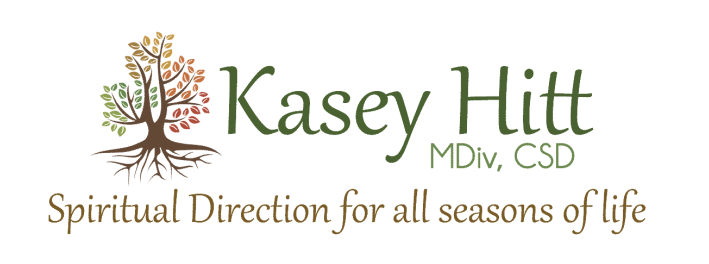Looking for a Personal or Family Prayer Practice for Lent? Try the Ancient Awareness Examen2/28/2017
 While not mentioned in the Bible, Lent, a season of self-examination and penitence leading up to Easter, has been observed by Christians since the 2nd century. It evolved into the current 40 days beginning on Ash Wednesday in the 6th century. When it comes to self-examinations, my favorite is the 16th century Awareness Examen by Saint Ignatius of Loyola (the founder of the Jesuit religious order). He thought examining the moments of "consolation" and "desolation" to be so instrumental to one's prayer life that during the Council of Trent when the Jesuits asked if they could skip their prayer exercises because they were so busy, his response was they could skip anything but the Examen. Noticing God's presence in their daily lives would help them best draw near to and follow God during such a busy time. As we draw near to God though examining our daily life, we discover three gifts--balance, wholeness and discernment. Rather than rushing through a day and labeling it all "good" or "bad," I can gently look back over it, discovering there was more than met my hurried eye. Moments I thought insignificant end up being full of meaning, at times offering a completely different or at least a more balanced perspective of the day I labeled. Rather than being a product of my personality, the lens with which I view the world is offered a gentle corrective. Perhaps you're like one of my children who sees the world through a more negative lens, it's harder for her to remember her happiest moment in a given day. Or you may see the world through overly-positive eyes, ignoring the moments of anger and sadness. No matter what our lens, the Examen helps us consider parts of our day and ourselves we may not naturally see. As we do, we are reminded that God welcomes the whole of us and is fully with us in and speaking through every kind of moment. Rather than letting life live me, regularly engaging the Examen and even keeping a record of my reflections offer keys for discernment from my own life to guide my life. Looking back over our moments of "consolation" and "desolation" we may see themes and patterns emerge. Clarity for decisions and callings become apparent in reviewing what has been life-giving and life-draining or where God's presence has been most experienced. This prayerful look over one's day or week can be done daily or weekly after dinner-time or before going to sleep. We can practice it privately or communally. Both children and adults can engage the Examen which takes about 15 minutes. So find a quiet place, a family member or friend, and begin your time of reflection. Awareness Examen A version of St. Ignatius’ 16th century prayer by Kasey Hitt (2006-2007), Mark Yaconelli's Sabbath Retreat (2003), and Dennis, Sheila and Matthew Linn’s book, Sleeping with Bread: Holding What Gives You Life. Silence You might choose to light a candle as a reminder of the Holy Spirit’s presence, take a few slow, deep breaths, place your hand on your heart, or pray this Psalm, “God, examine me and know my heart, test me and know my concerns. Make sure that I am not on my way to ruin, and guide me on the road of eternity.” (Psalm 139:23-24) Events of the Day Ask God to help you look over your day (or week) and bring to your mind & heart the following two questions. (Choose one set beforehand) For what moment today am I most grateful? For what moment today am I least grateful? When did I feel the most alive today? When did I most feel life draining out of me today? When did I feel closest to God (or sense I was moving toward God) today? When did I feel most distant from God (or sense I was moving away from God) today? For young children: When were you happiest today? When were you maddest or saddest today? What did you feel good about today? What was your biggest struggle today (when did you feel sad, helpless or angry)? Thanksgiving & Forgiveness Hang out in your moment of thanksgiving, relive it in your mind's eye as a way of gratitude. Receive again the gifts offered to you in that moment and offer thanks to God. Recall the moment you are least grateful for without trying to change or fix it; be open to receive from God whatever God would like to offer. It may be the invitation to repentance, forgiveness, comfort, instruction, the nudge to ask for help, etc. Help for Tomorrow In your own words, thank God for today and ask God for help for tomorrow, whatever the need may be. Or close with this prayer: "God, thank you for the ways you are with us everyday, in every moment, loving us just as much in our best moments as in our worst. May we place this day in Your hands and trust that you will guide, teach and companion us through the day tomorrow. Help us learn to notice Your presence and invitations in our lives. In Christ's Name, Amen." If doing the Examen with others, share your two moments and allow your prayer for one another to flow from the sharing. Whether alone or with others, I hope you'll try this prayer practice at least 7 times over the next 7 weeks and see what happens! You might choose to keep a journal so at the end you can look back and see what patterns emerge offering discernment. Blessings to you this Lenten season!  Discernment is key to spiritual growth and having an adult faith. Rather than looking for someone else to "tell you what to do or believe," how does one sift through the options, choices and voices using Biblical wisdom? Well let's give it a try. Pick an issue for discernment. This could be the way you are currently praying or living, a choice or difficulty you're confronted with, options you're mulling over, a theological belief you're questioning, a relationship situation, or a change that's approaching. Use the questions below. With your issue for discernment in mind, you're going to ask questions springing from the overall themes of Scripture. It's true, one can pull any Scripture from its context to justify any belief or choice. However, just as Jesus summed up the entire Law in two commands, there are what I call “summing up” Scriptures and stories that remind us of overall themes repeated again and again in the Bible. Here is my current list of questions and their summing up references:
As I practice asking myself these questions and allowing them to run through my mind in spiritual direction, they become the unconscious filters through which I see, listen and think. Over the years I've added questions, been led deeper into the questions and discovered when/how I need to invite others into the questions (a dialogue that is different than having someone else make my decisions or tell me what to believe). Such questions can also guide communal discernment. May these questions be signposts and gateways along your path of discernment.
 "What's the ego?" my 6-year-old son asked me one day. "Oh good question," I said, "We need the ego. It's important because it helps us survive. It's the part of us that makes choices and decisions based on looking out for ourselves." We talked a little about some of these choices and decisions helping us survive and better ourselves. Then I asked him a question in return, curious as to his answer. "What happens if we only live from our ego, the part whose only concern is protecting and looking out for ourselves?" His answer was immediate, "We don't ever love." "That is exactly right! " I exclaimed surprised and humbled with how clearly he could see, "That's exactly what Jesus told people." In Matthew 16:25, Jesus says, "For those who want to save their life will lose it, and those who lose their life for my sake will find it." The life Jesus is talking about losing is the one built, shaped and ruled by our ego. While safety precautions, preferences, expectations, demands, aspirations, goals, knowledge, social acceptance, emotional reactions, and such are necessary for survival, none lead to the "way of Jesus." And Jesus reminds us that we find this way or "Kingdom" by becoming like a child. For apparently a child knows that unless we let these go, "We don't ever love."
 Ever find yourself angry when someone did not do what they were "supposed" to do or be who they were "supposed" to be? Whether it's a relationship with one person, your whole family or even your church family, there's bound to come trouble and disappointment. I was recently asked how I had discovered peace given my own disappointments and struggles. I was encouraged because this meant the person sensed peace in me where they had not before! The truth is, peace began to fill me when I started practicing letting go of the way I had pictured things. When I loosened my grip on demanding things and people to be how I wanted them to be, I was in for a surprise! Guess what happened? Scales fell from my eyes and I began to see how God was providing for me in ways I simply could not see when I was demanding how, when, and who. When I shifted from feeling angry and filled with bitter disappointment when "how, when and who" did not come through it was like the moment in Genesis 28:16 when Jacob exclaims, "“You were here all the time, and I never knew it!" We all have idealistic pictures as to how our life and relationships should look. This comes as no surprise, our culture schools us in desire and what it should look like so we pursue and learn to create illusion. This is especially true during holidays or important life events and stages. We have expectations. We long for the perfect experience or outcome. Actually, the core desire in the idealism is usually good. At the core I find the longing to give and receive love in all its forms from belonging to delighting. It's what we do with the desire as to whether or not it leads to life (and peace). As I observe my own life and the lives of others, here are some places we can go with desire so it remains life-giving: We can lament. The process of letting go of what we desired and pictured is difficult. God knows this, it's one reason why there are laments in the Psalms. In a perfect world, our relationships and society would not be so filled with wounded people wounding people (including ourselves). When we do not have the deep relationship we wish we had with a person or the co-workers we pictured, the church we desired or the family gatherings we had hoped for, we can allow ourselves to name, express and feel the loss. We can let go. From small, daily letting go to larger, deeper letting go, the smaller ones prepare us for the larger. For example, take Psalm 27:10, "Even if my father and mother abandon me, the Lord will hold me close." Who exclaims such a thing? Someone who has experienced God's steadfast love in the small betrayals and so trusts God in the big ones. This person recognizes that when others cannot provide, God can. Can you relate to others being unwilling or unable to come through? Just like the Psalmist, we can begin to release our stranglehold, our white-knuckled clutch, on whoever or whatever is not giving us what we want, need or pictured. We can transfer the people, situations and ourselves into the hands of God. We can be on the lookout. Perhaps one reason the text in Luke 17:21 can be translated either the Kingdom is "within or among you" is because both are true! When I let go of demanding a particular person or group meet my need then I am freed up to see how God is providing everything I need. It could arise within me or come through other people or parts of the created world I did not expect. Recognizing the ways the Spirit of Love is speaking from within ourselves takes practice. Yet sometimes when life is particularly overwhelming, no matter how strong our spiritual life, we are unable to access the Kingdom of God within us. This is when the Body of Christ (when functioning as intended) can step in and offer the steadfast, creative love of God. May we allow lament and letting go of the way we pictured things to clear our eyes and create space that we may see and receive the Kingdom of God.
|
AuthorKasey is a scarf, ball and club juggling spiritual director just outside of Nashville, TN. Play helps her Type-A, Enneagram 1 personality relax, creating space for poetry and other words to emerge. She also likes playing with theological ideas like perichoresis, and all the ways we're invited into this Triune dance. Archives
January 2024
Categories
All
|
By clicking “Sign up for E-News” I consent to the collection and secure storage of this data as described in the Privacy Policy. The information provided on this form will be used to provide me with updates and marketing. I understand that I may modify or delete my data at any time.

 RSS Feed
RSS Feed

